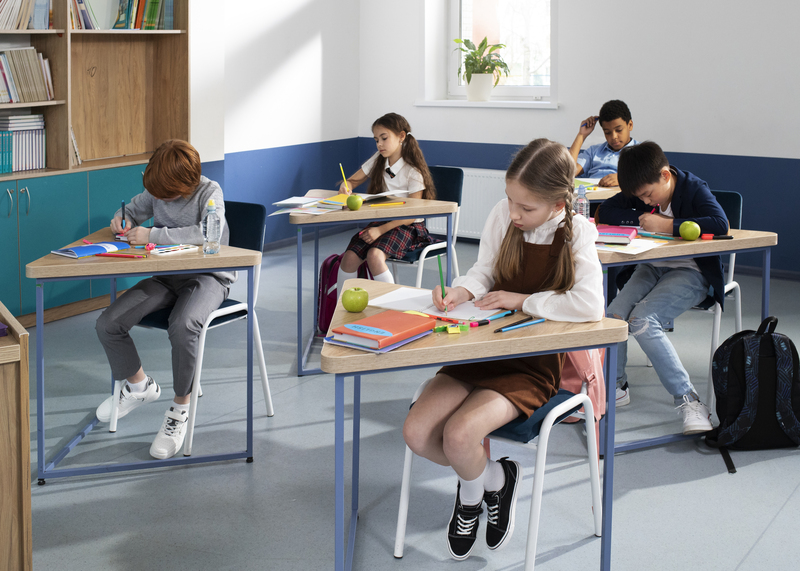Imagination is more than just something children engage in to preoccupy themselves or to pass the time.
It’s a fundamental cognitive skill that lets them explore and make sense of the world around them in their own little way. When their imagination is encouraged, children can also enhance their problem-solving, language, and inquiry skills, as well as their social and emotional skills, which are crucial in their development:
As a parent or teacher, your role is to create a learning environment where your children can exercise their imagination safely. Here are a few tips on how:
Enrol Them in a Good School
If you’re a parent, then you know how important it is to place your child in a good school environment. Not only will the institution provide your child with a strong foundation for cognitive and social development, but you can also rest assured that they’ll be exposed to a variety of stimulating activities that promote imaginative thinking. Schools that have a well-designed curriculum often incorporate creative subjects, such as music and art, encouraging children to express themselves in diverse ways. They also provide lessons and interactive learning environments that can spark a child’s curiosity and inspire them to think outside the box.
When searching for a school in Singapore, look for one that offers a range of subjects and extracurricular activities that provide children with exposure to different forms of expression and thought processes. You should also check if the educational institution’s list of faculty members consists of qualified educators who are trained and experienced in creating an inclusive and encouraging atmosphere that allows children to explore their creative potential.
Take Kinderland as an example. This preschool is a member of the Crestar Education Group and is a leading provider of quality infant care and bilingual education for children aged two months to six years. Kinderland offers music-infused curriculum to enhance the language literacy of their young students. Their music programme is facilitated by professional music teachers with internationally recognised qualifications. Apart from music, Kinderland also offers bilingual classes, a phonics programme, and S.T.R.E.A.M (Science, Technology, Reading & wRiting, Engineering, Arts, and Mathematics) lessons. Visit Kinderland’s Instagram profile and Kinderland’s YouTube channel to learn more and see the children in action.
Have Them Engage in Activities That Spark Their Imagination
Children’s imaginations flourish through active engagement in activities that stimulate creative thinking. That’s why letting them participate in activities that spark their imagination can improve their cognitive development and let them express their emotions in a safe space. Here are three activities you can try:
Pretend Play
Pretend play, also known as imaginative play or role-playing, allows children to step into different roles, scenarios, and worlds. Whether they’re playing house, pretending to be superheroes, or creating make-believe adventures, this activity encourages creativity, empathy, and abstract thinking in children. It’s a natural way for children to explore various perspectives and experiment with different roles, helping them develop a rich inner world of possibilities.
Charades
Charades is a classic game that encourages children to express ideas and concepts without verbalising them. It challenges their creativity as they use gestures, body language, and facial expressions to convey a word or phrase. This not only enhances their ability to think on their feet but also stimulates their imagination as they embody different actions, animals, or objects.

What Happens Next?
This activity involves storytelling with a twist. After setting up a scene or scenario, children take turns adding to the narrative, describing what happens next. It exercises their creative thinking skills as they contribute to an evolving story, often taking unexpected and imaginative turns.
Provide Them with Materials That Promote Creativity
Creativity blooms when children have the freedom to express themselves through various mediums. Art supplies like crayons, markers, paints, and paper can turn any space into an art studio where children can create visual representations of their thoughts and feelings. This not only fosters artistic skills but also allows them to communicate ideas in unique ways. Moreover, the tactile nature of art supplies engages multiple senses, promoting sensory exploration and awareness. As children experiment with different materials, they learn to make choices, solve problems, and adapt their creative process.
Invest in Open-Ended Toys
Open-ended toys are those that don’t have a predetermined use or outcome, leaving room for children to explore and create their own narratives. Unlike toys with fixed functions, these items encourage children to invent their own stories, scenarios, and rules, promoting independent thought and problem-solving. They also inspire creativity in young ones by providing them with a blank canvas for their imagination to run wild. Examples of such toys include building blocks, dolls, action figures, and modelling clay.

Allow Them to Have Unscheduled Time
Allowing moments of free play and unstructured activities is crucial for the development of imagination in children. Unscheduled time provides them with the mental space to tap into their creativity without the constraints of schedules or external expectations. During these periods, children are free to follow their interests, initiate spontaneous play, and even read books that stimulate their imagination. It also allows for moments of relaxation and reflection, reducing stress and providing an opportunity for children to process their thoughts and experiences. What’s more, unstructured time usually involves interaction with peers, improving their social skills such as communication, cooperation, and conflict resolution.
Reduce Their Screen Time
Excessive exposure to screens, be it television, tablets, or smartphones, can impede creative thinking and hinder the development of essential skills. This is because screen-based entertainment is known to provide passive stimulation, leaving little room for children to engage in active imaginative play. In this regard, reducing your children’s screen time will encourage them to interact with their surroundings and engage in traditional play. Without the constraints of pre-programmed content, children are free to create their own narratives and games that boost their creativity and imagination. Reducing their screen exposure also allows them to focus on activities for more extended periods, improving attention and concentration.
Giving children an environment where they can freely exercise their imagination does wonders for their early childhood years. Allowing them to come up with their own stories, games, and scenarios improves a multitude of skills, from problem-solving to social-emotional skills, which helps them better navigate the world around them. With the help of these tips, you’ll be able to create an atmosphere, whether it’s at home or school, that nurtures this aspect in your children’s development.




